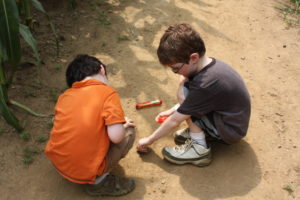How Do You Get To Carnegie Hall? Practice, Practice, Practice!

If you really want to become a good writer, in this lifetime, you have to write. You have to write a lot.
Here are seven of the best tips from last year’s StoryADay participants, to help you become an insanely productive, happy and sane writer. Plus one bonus tip and a question for you, at the end.
“Nothing will work until you do.”
-Maya Angelou
Insanely Productive? Yes, Please!
1. Have ideas ready to go
There is nothing worse than carving out some time to write and then being stuck for a place to start. So start now: pay attention to all the ideas you have, all the time, when you are away from your desk. Carry a notebook around. Capture snippets of conversation, what ifs that occur to you as you people-watch, thoughts spurred by other people’s stories. Write them all down, ready to be picked up again when you sit down to write.
2. Write First
When you sit down to write, actually write. Don’t check email, don’t check Twitter, don’t even check the StADa site (unless you need the daily prompt). Just leaf through your ideas until you find one you can work with, and go. Turn off your email notifications, close all the browser windows. Don’t worry about fonts and formatting or whether it’ll be any good. Just write.
@Gabi If I think too much about writing before I actually start doing it, I tend to psych myself out. Instead I just start writing and before I know it, I’ve got a bunch of words on the page and it’s time to call it a day.
3. Keep writing until you finish
Starting stories is all very well, but anyone can do that. The point of StADa is to help you learn to craft a whole, finished story. Keep writing until you finish. Even if you hate it, keep writing. You’ll thank me later.
4. Unless you must take a break
Obviously, if your kids are screaming or someone comes to the door to tell you you’ve won $10million in the lottery, or your boss calls to ask where you are, you might have to get up from your desk before your story is finished. In which case, go. But keep thinking about your story. Leave it in the middle of a sentence, so that you’re ready to leap back in, and go. But keep thinking about it. When you’re walking to the coffee machine, wonder what your characters will do next. When you’re doing some menial, mindless task (can you tell I’m a mother?) let your mind wander and picture how you’re going to resolve the central mystery of your story. If someone turns on a radio, listen to how people talk and steal yourself some dialogue.
@KristenRudd says: “My trick so far is to mull my story all day, while I’m doing whatever it is I do. I think about the directions it could go, but I mostly think about how to open it. Then, when I can finally sit down after the kids are in bed, the dishes are washed, and I’ve done everything else that needs doing, I’m excited about the story that’s been buzzing all day.
5. Make it priority #1
You can put off watching TV shows and you can turn down an occasional invitation for coffee without your life falling apart. Tell people you’re working on your writing this month, that you’ll be a better friend next month (maybe). Take some time to make your writing your top priority. You’ll always wonder, if you don’t, what you could have achieved. Explain to friends that you are investing in your dream of becoming a writer, just as they might make time to invest in a course of golf lessons or an art workshop. If you want to take your writing seriously you will find that something’s got to give, but the good news is: that could be the housework!
StADa: How do you make time for writing?
@AdorablyAlice This is a good question. And when I have an answer that doesn’t involve neglecting chores/cooking, I’ll let you know.
6. Write Wherever/Whenever You Can
It’s tempting to think that you need solitude, silence and a particular pen to be able to write, but that’s a rookie mistake. Professional writers write wherever and whenever they can squeeze in some time.
- Ray Bradbury rented a typewriter in a typing room in the basement of a library and typed until time ran out. That couldn’t have been quiet or private or relaxing, but he’s one of the most prolific writers around.
- Stephen King wrote in a passageway in the back of a trailer, with two toddlers, a wife and a full-time job in a laundry jostling for his attention.
- PD James worked for the Home Office by day, visited her sick husband in hospital on the weekends, and put her two daughters to bed alone, and wrote her first novel — all during the London Blitz!
You may need some peace and quiet to get a story started, but once you’re up and running, write! Write when ever you have 15 minutes, wherever you are, with whatever comes to hand. Write!
(Hint: you full-time workers have the gnawing envy of stay-at-home parents of young children: you get a lunch break. Are you sneaking off somewhere and using it for writing?)
7. Be realistic
You’re not going to write an epic or a polished draft in a day. You’re going to write something and it’ll likely be bewtween 30 and 2000 words. The more frequently you write and finish a story, the more you’ll get a sense for how to pace yourself and your story. Don’t waste time on backstory or explaining anything at the beginning. Jump in half way through and unpack the story as you go. Some of it will be terrible, some of it you will learn from and some of it might even be quite good. On a good day you’ll write a character you’re proud of or make yourself smile with a twist, or discover you can write really convincingly about a gardener.
@GabiOnly a handful of the stories are worth keeping and working on. One of them has spawned into an idea for a middle-grade book that I am in love with.
Every lesson enriches your writing. Every day you practice, you’re one step closer to Carnegie Hall.
Bonus Tip: Be part of a community.
I know a lot of us are loners (I certainly crave my ‘alone’ time) so the idea of joining a community seems strange. But one of the most valuable lessons I have learned in the past year is the value of having people on your side, people who understand what it’s like try to write, people who are rooting for you (because if you can do it, maybe they can too).It was incredibly inspiring to drop in to the StoryADay.org forums during May – and afterwards ‘meet up’ with people on Twitter – and trade stories of how our writing day is going.
Join our Serious Writers’ Accountability Group (SWAGr) and post your goals for this month…today! (We’re “Serious”, not sombre. All are welcome!)
Thanks to all the previous participants for their comments and suggestions, quoted here or otherwise.
What do you do to keep writing? Share your best tips in the comments.
To be among the first to hear when sign-ups open for this year’s challenge sign up for the Advance Notice List. (No spam. Just StoryADay.org news)




